How to Start a Medicinal Herb Garden at Home
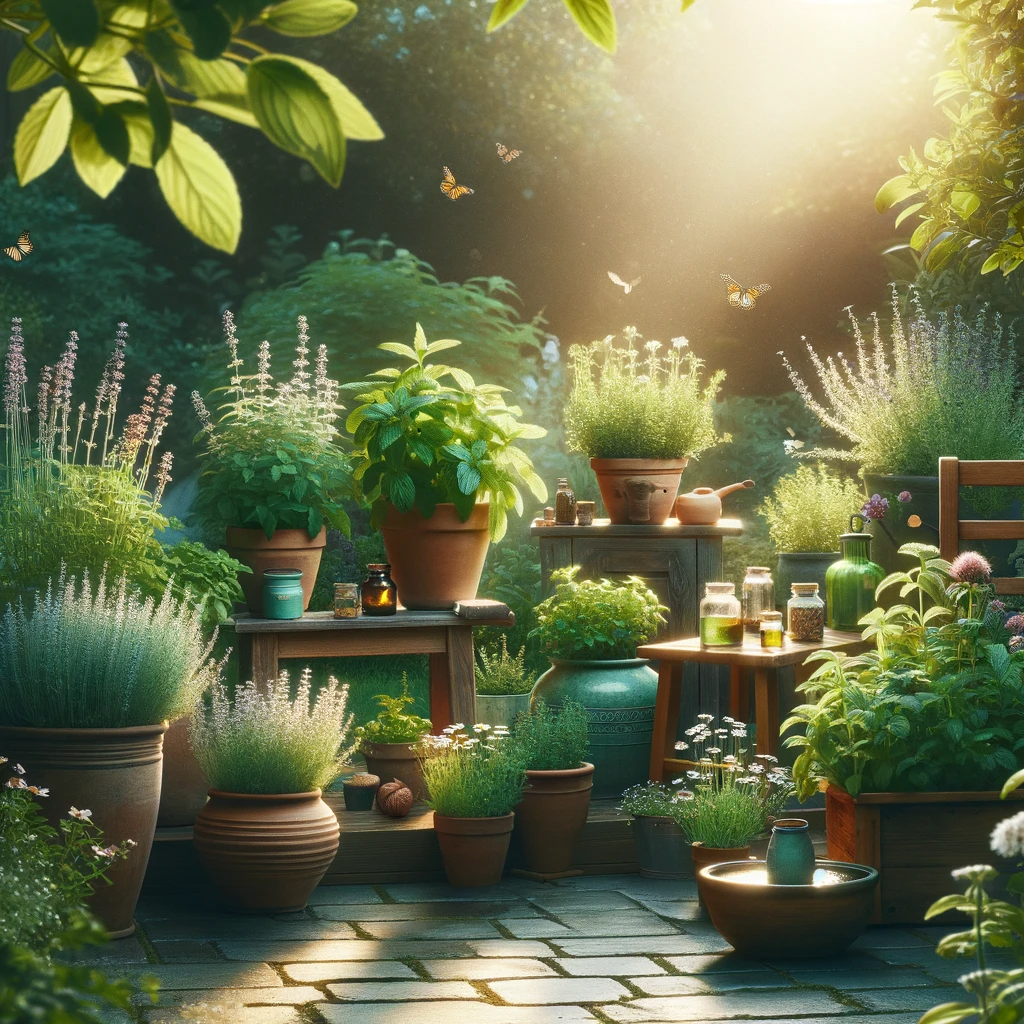
Key Takeaways Table
| Aspect | Details |
|---|---|
| Selecting the Right Herbs | Tips on choosing herbs that thrive easily and have medicinal properties. |
| Setting Up Your Garden | Guidance on creating the ideal environment for a herb garden at home. |
| Caring for Your Herbs | Advice on maintaining and nurturing your herbs for optimal growth. |
| Harvesting and Usage | Instructions on how to harvest and use your herbs effectively. |
| Expanding Your Knowledge | Links to resources for further learning about medicinal herbs and their uses. |
Creating a medicinal herb garden at home can be a deeply rewarding and therapeutic endeavor. It allows you to grow and use your own herbs for various health benefits, adding a touch of nature’s magic right in your backyard or windowsill. In this guide, we will walk you through the steps to start your own medicinal herb garden, ensuring you have all the information to make it flourish.
Selecting the Right Herbs
When starting your garden, the first step is to choose the right herbs. Consider factors like your local climate, the space available, and your personal health needs. For beginners, some easy-to-grow herbs with notable medicinal properties include:
- Mint: Known for its refreshing aroma, mint aids digestion and can relieve headaches.
- Chamomile: A soothing herb, excellent for reducing stress and promoting sleep.
- Lavender: Renowned for its calming effects, lavender is also great for skin health.
For more insights into selecting herbs, you might find the “Beginner’s Guide to Healing Crystals” helpful, as it not only discusses crystal properties but also delves into complementary herbal uses.
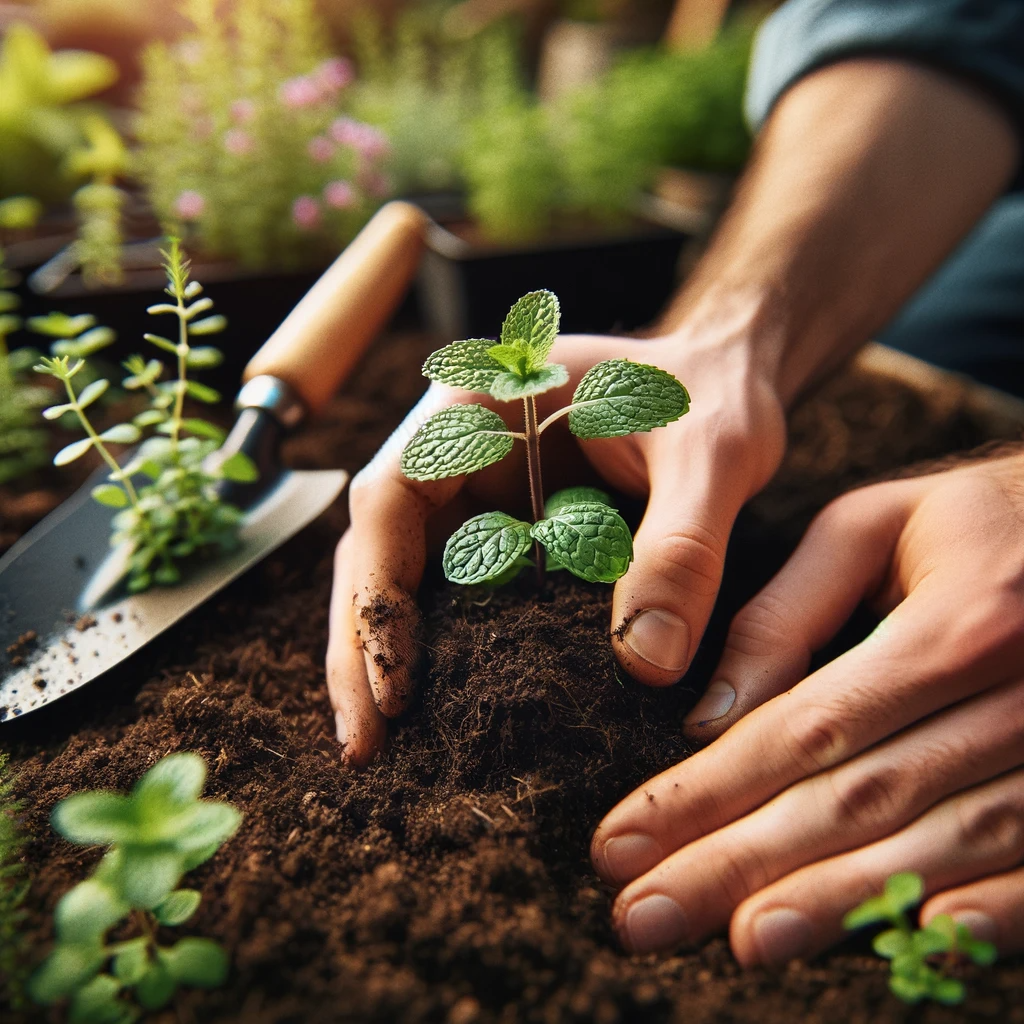
Setting Up Your Garden
Location and Soil
Choose a location that receives adequate sunlight – most herbs thrive in well-lit areas. Ensure the soil is well-drained and rich in organic matter. If space is a constraint, consider container gardening, which offers flexibility and control over soil conditions.
Planting
You can start your garden with seeds, seedlings, or cuttings. If you’re using containers, make sure they have enough room for the herbs to grow and adequate drainage holes.
For more detailed instructions on setting up your garden, consider reading about “Crystal Energy Cleansing”, as it shares valuable insights on creating harmonious spaces, a concept that can be applied to garden setups.
Caring for Your Herbs
Watering and Feeding
Herbs generally prefer consistent moisture, so regular watering is key. However, avoid over-watering as it can lead to root rot. Feeding your herbs with organic fertilizer can also promote healthier growth.
Pruning and Pest Control
Regular pruning encourages growth and prevents herbs from becoming leggy. Natural pest control methods, such as introducing beneficial insects or using organic sprays, can keep your garden healthy.
For a deeper understanding of nurturing and energy balancing, the article on “Reiki Healing Guide: Channeling Universal Life Force Energy” might offer interesting parallels in caring for your garden.
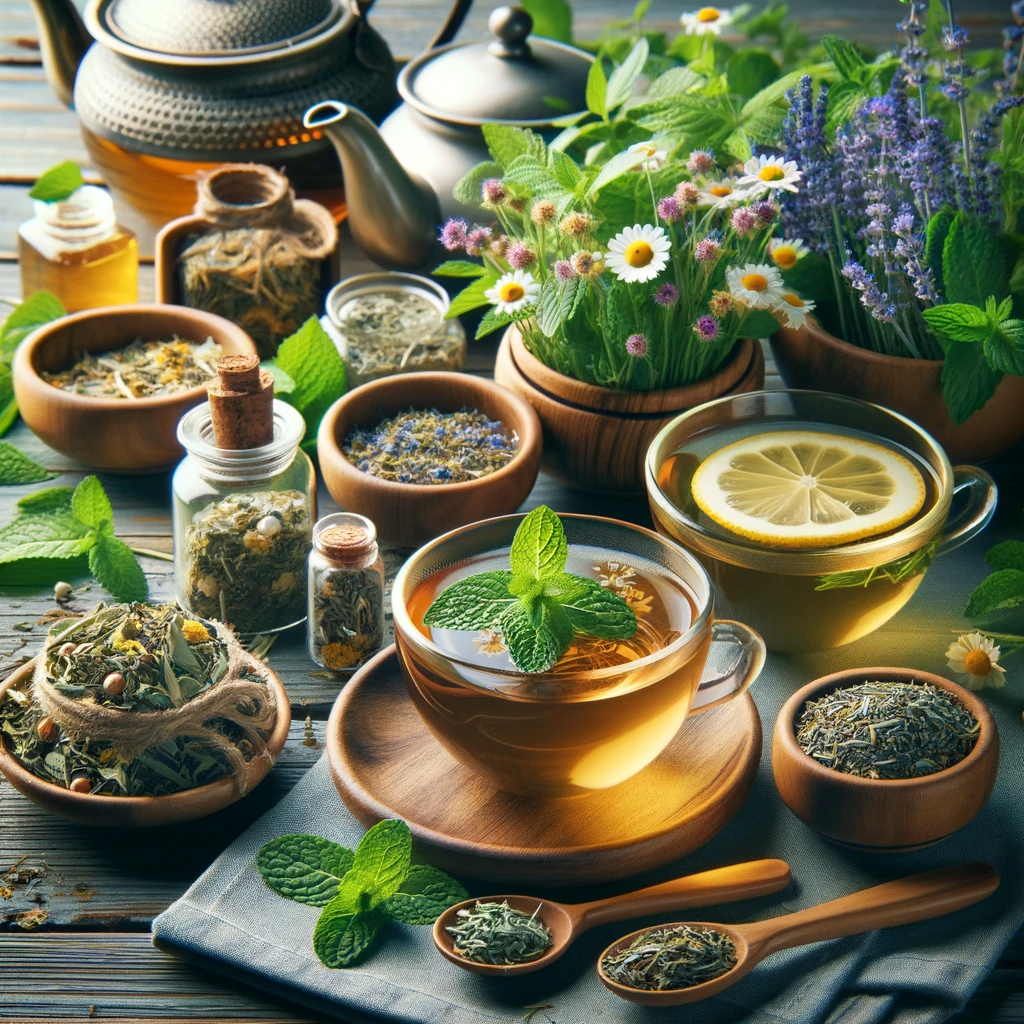
Harvesting and Usage
Harvest your herbs regularly to encourage new growth. Dry or freeze the excess for future use. Herbs can be used in cooking, teas, or as natural remedies for various ailments.
To expand your knowledge on the usage of natural elements for health benefits, exploring “Natural Remedies for Common Health Issues” can be enlightening.
Expanding Your Knowledge
As you become more comfortable with your herb garden, you might want to delve deeper into the world of medicinal plants and their uses. Resources like the “Step-by-Step Tarot Reading Guide” can offer a unique perspective on connecting with nature and understanding the deeper meanings behind your gardening journey.
Enhancing Your Garden’s Ambiance
Creating a Relaxing Space
Your herb garden can be more than just a place for plants; it can be a sanctuary for relaxation and meditation. Adding elements like small benches, wind chimes, or even a water feature can transform it into a tranquil retreat. Embracing practices from the “Holistic Therapy Guide” can further enhance this space, making it a haven for both physical and mental well-being.
Integrating Aesthetic and Functional Design
Consider the aesthetic appeal of your garden. Arrange herbs with varying heights and colors to create visual interest. Functional design is also key – ensure that everything is easily accessible for maintenance and harvesting.
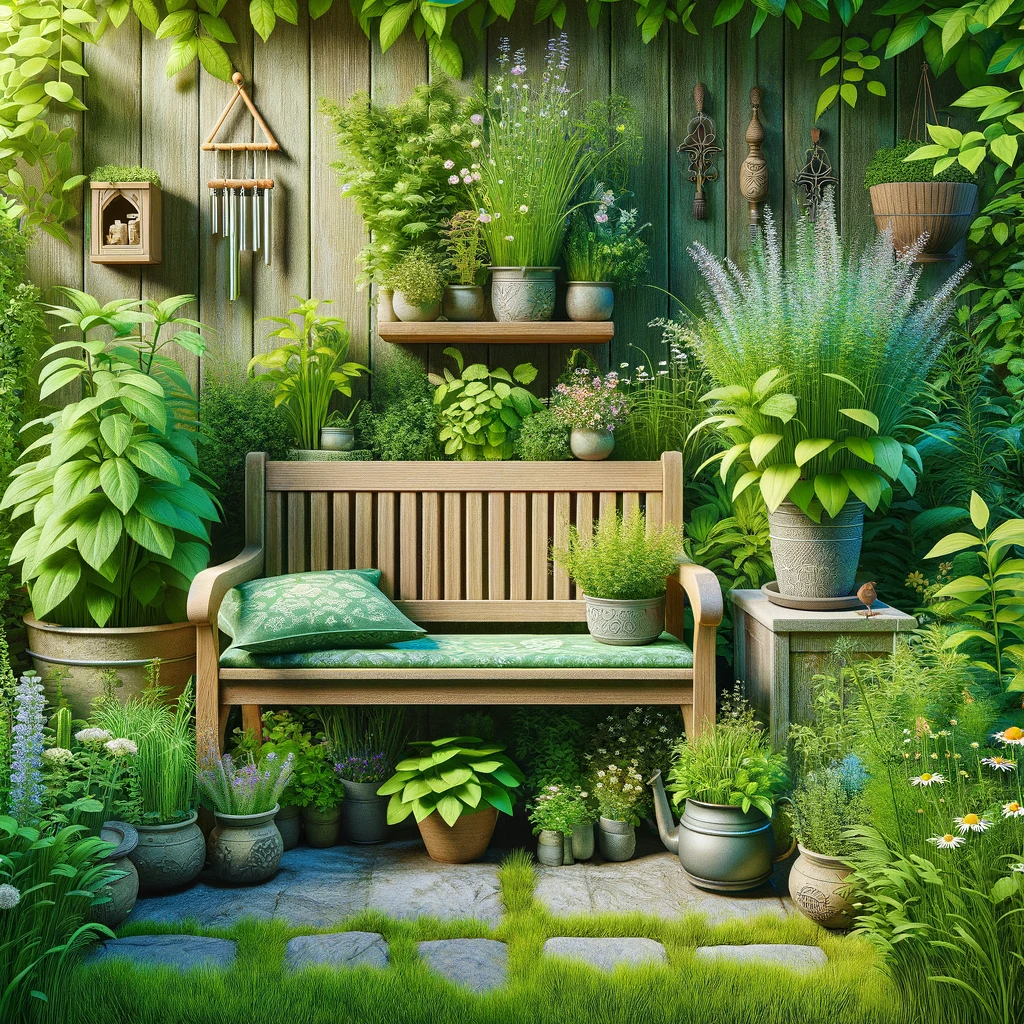
Using Your Herbs in Daily Life
Culinary Uses
Many medicinal herbs are also culinary treasures. Incorporating them into your cooking not only adds flavor but also boosts nutritional value. For instance, basil can be used in sauces, while rosemary is excellent with roasted dishes.
Therapeutic Applications
Herbs like lavender and chamomile can be used to make soothing teas or essential oils, aiding in relaxation and sleep. You can also create herbal sachets or baths for a spa-like experience at home.
For more culinary and therapeutic applications, the “Crystal Bottle Reviews” offers insights into how integrating crystals with herbs can amplify their healing properties.
Sustainable Practices in Herb Gardening
Composting and Water Conservation
Implementing sustainable practices such as composting kitchen scraps and using water-conserving irrigation systems like drip hoses or rain barrels can significantly benefit your garden.
Encouraging Biodiversity
Attracting beneficial insects and birds by planting a variety of herbs and flowers can create a balanced ecosystem in your garden, naturally controlling pests and promoting pollination.
To understand more about creating a sustainable and harmonious environment, you might find valuable information in the “Best Sage Kits” article, which discusses the importance of purifying and maintaining energy balance in spaces.
Connecting with a Community of Gardeners
Joining Local Gardening Clubs
Connecting with local gardening clubs or online forums can provide you with a wealth of knowledge and support. Sharing experiences and tips with fellow enthusiasts can be incredibly rewarding.
Exploring Workshops and Courses
Consider enrolling in workshops or courses to deepen your understanding of herb gardening. This not only improves your skills but also allows you to meet like-minded individuals.
Documenting Your Herb Gardening Journey
Keeping a Garden Journal
Documenting your gardening journey can be a fulfilling practice. Record your planting dates, growth observations, and any changes you make. This not only helps in tracking your garden’s progress but also serves as a valuable reference for future gardening endeavors.
Sharing Your Experience Online
Consider starting a blog or social media account dedicated to your herb garden. Sharing photos, tips, and experiences can inspire others and also provide a platform for exchanging ideas with a wider community.
For insights into effective communication and sharing knowledge, exploring the concepts in “Unlock the Potential of Moon Reading and Discovering Passions” can be quite enlightening.
Overcoming Challenges in Herb Gardening
Dealing with Pests and Diseases
While natural methods are preferred, sometimes you may face challenges with pests and diseases. Learning about organic pest control methods and disease-resistant herb varieties can be crucial in managing these issues effectively.
Adapting to Weather Changes
Herbs can be sensitive to extreme weather conditions. Learning to adapt your gardening practices to suit different seasons is key to maintaining a healthy garden.
For more on adapting to environmental changes, the “Best Tarot Sets” article offers a unique perspective on navigating and understanding the cycles of nature.

Future Expansion of Your Herb Garden
Trying New Herb Varieties
As you gain confidence, experiment with new herb varieties. This not only adds diversity to your garden but also expands your knowledge and use of different medicinal plants.
Exploring Advanced Gardening Techniques
Once you’re comfortable with the basics, you might consider exploring advanced gardening techniques like hydroponics or permaculture to further enhance your gardening experience.
The article on “Chakra Wealth DNA Activation” provides interesting insights into the concept of energy flow, which can be metaphorically applied to the flow of nutrients and growth in your herb garden.
Integrating Technology into Your Herb Garden
Using Gardening Apps
There are numerous apps available that can help you manage your garden more effectively. From plant identification to watering reminders, these tools can simplify your gardening process.
Smart Gardening Tools
Invest in smart gardening tools like soil moisture sensors or automatic watering systems. These technologies can ensure optimal growing conditions and save time in garden maintenance.
For a deeper dive into the intersection of technology and natural practices, the “Genetic Wealth Review” discusses how modern advancements can complement traditional methods.
Exploring the Health Benefits of Herbs
Understanding Herbal Medicine
Educate yourself about the health benefits and potential uses of the herbs you grow. Many herbs offer therapeutic properties, from boosting immunity to relieving stress.
Consulting with Herbalists or Health Professionals
Before using herbs for medicinal purposes, it’s wise to consult with a professional herbalist or healthcare provider, especially if you have existing health conditions or are taking medication.
The article on “Holistic Nutrition for Health” offers valuable insights into integrating natural elements into your health regimen, emphasizing the importance of professional guidance.
Engaging in Community Projects
Starting a Community Garden
If you have the space and resources, consider starting a community herb garden. This can be a great way to bring people together, share knowledge, and promote sustainable living.
Volunteering and Learning
Volunteering at local botanical gardens or herb farms can provide practical experience and deepen your understanding of herb gardening on a larger scale.
For inspiration on community involvement and the power of collective efforts, the “Astral Travel: The Royal Road to Self-Knowledge and Healing” article sheds light on the journey of self-discovery and community connection.
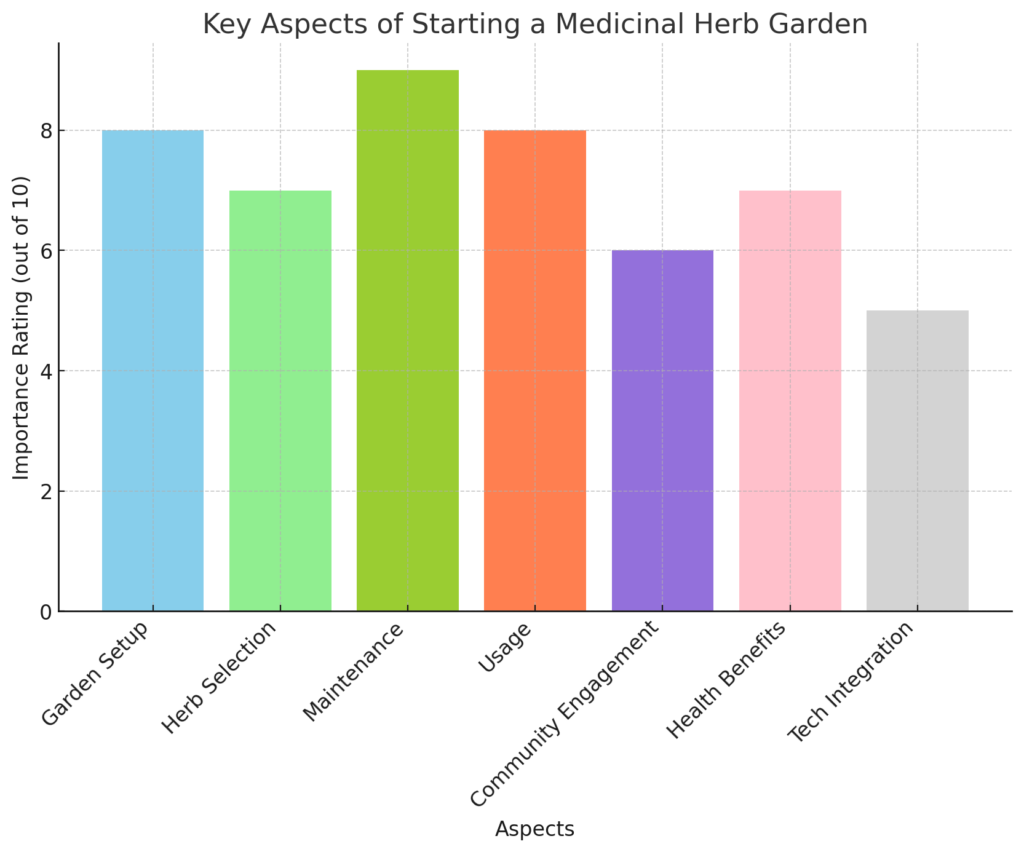
Final Thoughts and Next Steps
Reflecting on Your Gardening Journey
As you develop your medicinal herb garden, take time to reflect on the progress you’ve made. Observe how your garden changes with the seasons and how these changes affect your daily life and well-being.
Continuous Learning
Gardening is a lifelong learning process. Stay curious and open to new techniques, plants, and approaches. Resources like the “Mystery School Code Review” can offer unique insights and deepen your understanding of the natural world.
Sharing and Inspiring Others
Your journey can inspire others to start their own herb gardens. Consider hosting workshops or garden tours to share your knowledge and experiences.
Embracing the Holistic Benefits
Remember, your herb garden is more than just a collection of plants. It’s a source of health, joy, and a deeper connection to the natural world. Embrace this journey fully and enjoy the multitude of benefits it brings to your life.
Starting a medicinal herb garden at home is a fulfilling journey that enhances not just your physical space but also your health, knowledge, and community connections. By following these steps and continually exploring, learning, and sharing, you create a living space that nurtures both the body and soul. Happy gardening!
